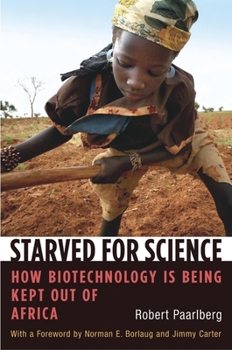Starved for Science: How Biotechnology Is Being Kept Out of Africa
Select Format
Select Condition 
Book Overview
Listen to a short interview with Robert PaarlbergHost: Chris Gondek Producer: Heron & Crane
Heading upcountry in Africa to visit small farms is absolutely exhilarating given the dramatic beauty of big skies, red soil, and arid vistas, but eventually the two-lane tarmac narrows to rutted dirt, and the journey must continue on foot. The farmers you eventually meet are mostly women, hardworking but visibly poor. They have no improved seeds, no chemical fertilizers, no irrigation, and with their meager crops they earn less than a dollar a day. Many are malnourished. Nearly two-thirds of Africans are employed in agriculture, yet on a per-capita basis they produce roughly 20 percent less than they did in 1970. Although modern agricultural science was the key to reducing rural poverty in Asia, modern farm science--including biotechnology--has recently been kept out of Africa. In Starved for Science Robert Paarlberg explains why poor African farmers are denied access to productive technologies, particularly genetically engineered seeds with improved resistance to insects and drought. He traces this obstacle to the current opposition to farm science in prosperous countries. Having embraced agricultural science to become well-fed themselves, those in wealthy countries are now instructing Africans--on the most dubious grounds--not to do the same. In a book sure to generate intense debate, Paarlberg details how this cultural turn against agricultural science among affluent societies is now being exported, inappropriately, to Africa. Those who are opposed to the use of agricultural technologies are telling African farmers that, in effect, it would be just as well for them to remain poor.Format:Paperback
Language:English
ISBN:0674033477
ISBN13:9780674033474
Release Date:May 2009
Publisher:Harvard University Press
Length:256 Pages
Weight:0.56 lbs.
Dimensions:0.7" x 5.4" x 8.1"
Customer Reviews
1 rating
Truths beyond popular culture
Published by Thriftbooks.com User , 16 years ago
Friday, June 13, 2008 - Feminist Review.org As a mom who does what I can to buy organic food for my family, I completely understand the general distaste most of us have for genetically modified (GM) foods. The very thought of vegetables altered by scientists in labs seems creepy and somehow inherently wrong, doesn't it? But when I read Starved for Science, I quickly realized that such a romanticized and emotional standpoint in such a critical debate as starvation is not only uninformed, it is just plain irresponsible. I also realized that, whether we like it or not, most of us are already eating GM foods on a daily basis. In plain language and with plentiful sources to back up his positions, Paarlberg describes how in first world countries, where food is plentiful and obesity more of a problem than starvation, people can afford to pine for the days of small neighborhood farms - and can turn up their noses at the agribusiness and subsequent science that has allowed us to take for granted having not only enough to eat, but a wide choice in what and where we get our food. In Europe, the negative public opinion toward genetically modified organisms (GMO's) has led to labeling and bans on imports suspected to be "contaminated" by genetically altered seeds. Greenpeace and many NGO's are working actively to keep African farmers on small plots of land using techniques that date back thousands of years, but to the detriment and hardship of those very farmers. Paarlberg describes how rich countries have come to fear and dislike GMO's, stopping funding and support easily where food is in no shortage, and yet when it is convenient, still continue to fund their use in the pharmaceutical industry where a longevity benefit can be gained. And governments in African countries situated in urban areas that are highly influenced by European bias, both in cultural influence and monetary flow, follow suit. Therefore, they are not developing their own programs to find strains of seeds that could resist drought, and it isn't worth enough money to anyone else to do so for them. The majority of small farms in Africa are currently run by women, as men often leave to find other jobs in mines or more urban areas to supplement family incomes. Children stay out of school to help with the farming, and they do it all with wooden tools and poorly fed animal labor. Green movements in China and India have brought these countries to a position where starvation in no longer such a pressing issue; however, in Africa the problem is worse than ever. Paarlberg admits to having kept his research a bit under wraps until now, knowing the reaction he would get from his own circle of friends and colleagues. It could be said that being `socially conscious' has taken on certain assumptions (and presumptions) among the wealthier strata of our urban world with a borg-like uniformity, and in the case of poverty in Africa, maintaining a position of being purely organic could easily be likened






